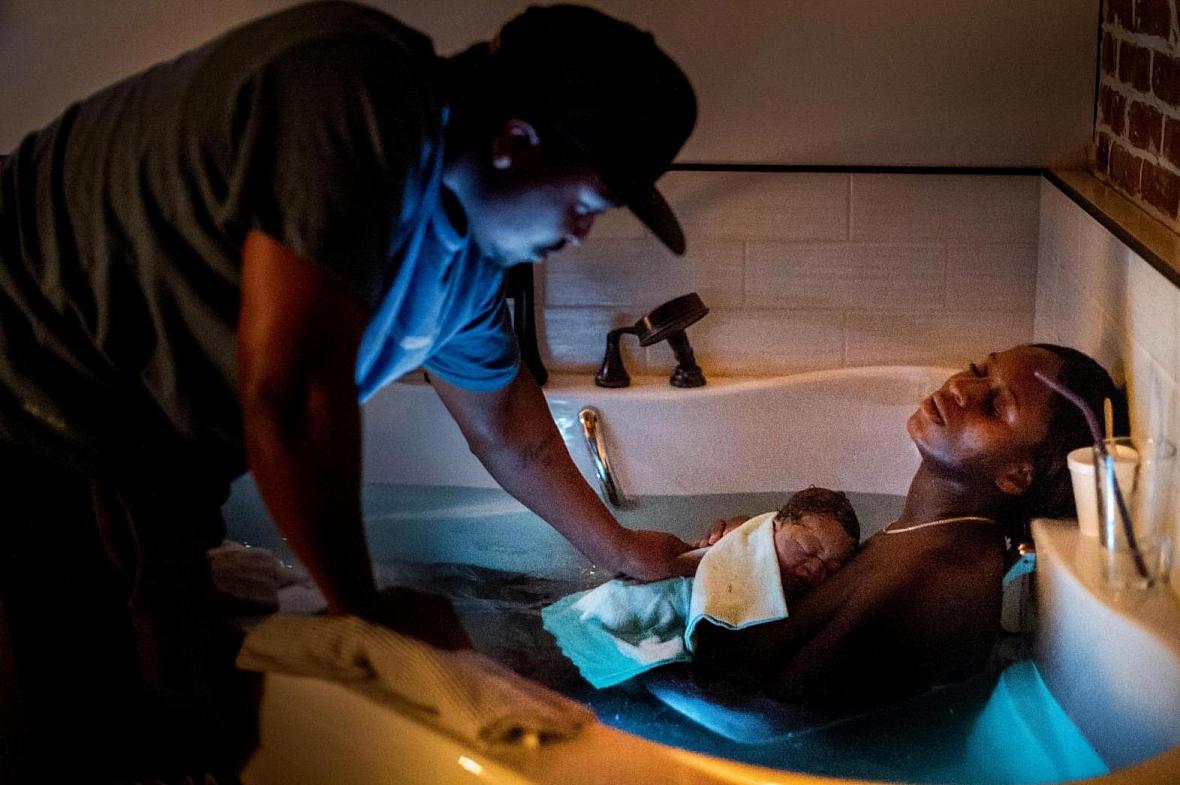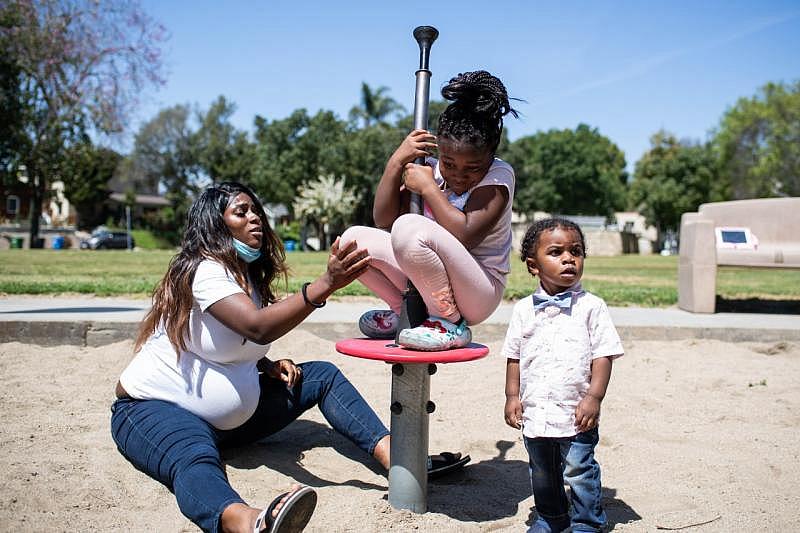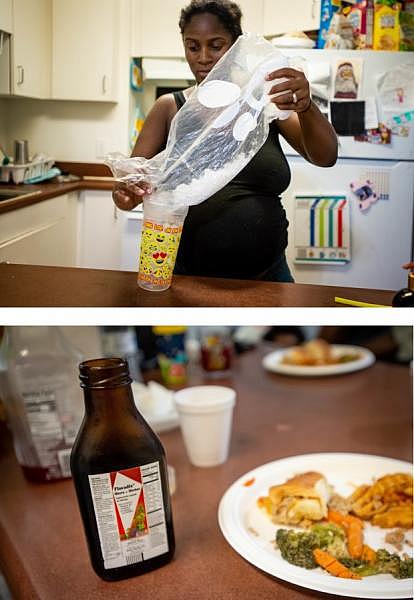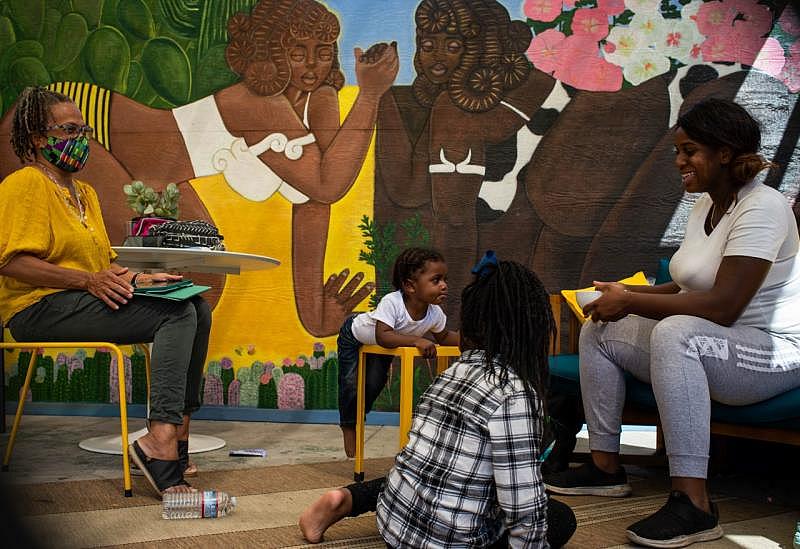Pregnant during pandemic: Programs, midwives step up to support Black mothers
This is the first story in "Pregnant during Pandemic," a series by Olga Grigoryants, a participant in the USC Annenberg Center for Health Journalism’s 2021 California Fellowship.
Her other stories include:
Part 2: Pregnant during Pandemic: Black midwives in demand; are there enough to handle influx of clients?
Part 3: Birth centers grow in popularity, but owners say it’s difficult to qualify for state license
Part 4: Pregnant during pandemic: COVID-19 fears fuel increased interest in home births
Part 5: Pregnant during pandemic: Expectant mothers remain at high risk of COVID-19

Dennis touches their son as Aysha rests in the birthing bath at Kindred Space LA’s South LA birthing center on Mother’s Day night, May 9, 2021.
(Photo by Sarah Reingewirtz, Los Angeles Daily News/SCNG)
Aysha-Samon Stokes’ Mother’s Day went just as planned.
She arrived at Kindred Space LA birth center around 10 p.m. on May 9, stepped into a bathtub and shortly before midnight pushed her newborn son, Nikko, into the arms of her boyfriend, Dennis Richmond.
Minutes later, she climbed into a bed, wrapped her arms around the baby and breastfed him as “Heartbreak Anniversary” by Giveon played in the background and Richmond massaged her feet.
She felt relieved and happy, surrounded by her niece, boyfriend, sister and two midwives, who carefully guided her through labor. There was something else giving her peace of mind: Her childbirth bill was covered by the Victoria Project, a nonprofit that helps women in Los Angeles County pay their childbirth-related expenses.
Pregnant with her third child Aysha-Samon Stokes, 26, plays with her children Nyla Richmond, 6, and Wyatt Richmond, 17 months, at a Culver City park close to her daughter’s school on Thursday, April 8, 2021. Looking for a better birthing experience Stokes found a midwife to deliver her baby. (Photo by Sarah Reingewirtz, Los Angeles Daily News/SCNG)
Stokes found out about the Victoria Project during her last trimester from midwives Allegra Hill and Kimberly Durdin, who run Kindred Space LA.
It was not a single event that made her consider home birth, she said, but rather a series of memories from her previous two pregnancies: An obstetrician-gynecologist who couldn’t remember her name, a nurse who ignored her plea for an epidural when her pain became intolerable and a C-section with her first pregnancy that she felt was unnecessary.
Something else was at stake once she began learning about the high mortality rate among women like herself.
“A lot of Black women die in the hospital and that does concern me,” said Stokes, 26.
The coronavirus has wreaked havoc on many women’s birth plans, forcing them to adjust to quickly changing hospital policies, and in some cases labor in isolation and even opt for home birth. The pandemic has been especially hard on mothers like Stokes, who even before the pandemic had been part of terrifying statistics that show Black women in the U.S. have more than a three times higher risk of dying during pregnancy and childbirth than White women.
Black mothers and infants have been disproportionately affected by pregnancy- and birth-related complications. Nearly 700 women die each year in the U.S. as a result of pregnancy-related complications.
In Southern California:
- In Los Angeles County, mortality rates among Black mothers from perinatal complications are four times higher compared to White women. Black infants are three times more likely to die before reaching their first birthday.
- In Riverside County, Black newborns are three times more likely to die than their white counterparts.
- Officials in Orange County reported in 2020 the death of one Black infant out of 392 African American births. So far in 2021, no infant or maternal deaths have been reported among Black infants or mothers, according to the Orange County Care Agency’s preliminary report.
- San Bernardino County, meanwhile, reported 11.3 deaths for every 1,000 Black infants born, the 2011-15 data show.
In 2018, the Los Angeles County Department of Public Health pledged to work on reversing the trend and reducing the county’s gap in Black and White infant mortality rates by 30% by 2023.
Dr. Deborah Allen, deputy director of the Los Angeles County Department of Public Health, said “midwives are a very important voice but they are a very small group of people. They’re all wonderful, but they have to be part of something bigger. It has to go way beyond that. It has to include medical professionals.”
There needs to be a movement, Allen said, that would involve systematic changes on the part of hospitals, medical professionals, and federal and state government agencies to make sure Black women feel safe to deliver their babies, whether at home or at hospitals.
“When we really want to have equality in birth outcomes, we need more than equal health care — we need equal lives,” she said.
Many of the county’s programs, Allen added, focus on addressing the consequences of intergenerational racism on the health of Black women.
The Los Angeles County African American Infant and Maternal Mortality Initiative, launched by the Los Angeles Department of Public Health and First 5 LA along with community partners, is offering no-cost doula care to Black pregnant people in Antelope Valley, San Fernando Valley, San Gabriel Valley and South L.A.
Doulas work with pregnant and birthing mothers before, during and after the delivery to provide emotional and physical support and guidance. Studies show that doula care proved to be effective with reductions in the use of C-sections and medications during labor along with promotion of breastfeeding.
“Having a well-informed, articulate, supportive person by your side, who knows the health care system and can be a buffer and a bridge when you’re dealing with medical providers and so on,” Allen said, “can really make the experience much more positive, much less stressful and, therefore, healthier for Black women.”
Aysha craves ice which she learned from her midwife was a sign of anemia. Her doula gave her a plant based iron supplement for her iron deficiency since she was not tolerating prescription iron from her obstetrician. (Photo by Sarah Reingewirtz, Los Angeles Daily News/SCNG)
The program, which just finished its first year of operations, has served 363 clients while supporting 199 births, and health officials say it can potentially become one of many aimed at reversing trends in high mortality rates among Black mothers.
“It’s time for Black women to stop feeling guilty when they have an adverse outcome and recognize it as a social phenomenon rather than a personal failing,” Allen said.
When the pandemic hit, Victoria Project co-founder Janelle Green couldn’t stop thinking about women who were afraid to go to the hospital to give birth and lacked the means to hire a midwife or doula to deliver their babies at home. As a trained midwife, she also knew that out-of-pocket expenses could easily become a financial burden for many families because insurance reimburses only a fraction of the costs.
She wanted to help women to have other options, she said.
Green reached out to a friend, Deja Rabb, and together they launched the nonprofit to finance midwifery and doula care, breastfeeding support, childbirth education services for pregnant women. The Victoria Project was born in September 2020.
“We named it after a victorious pregnancy that I hoped to one day have,” she said.
Green and Rabb connected with doulas and midwives in Los Angeles, offering assistance to their clients.
Currently, the nonprofit enrolls about 200 people and is close to its capacity, Green said. But as more families are hearing about the program, Green added, the goal is to start sponsoring more people, including those from Santa Barbara, where Green and Rabb now live.
Clients mostly learn about the nonprofit through word of mouth. Its funding comes from private donations and fundraising and is open to anyone who considers giving birth at home or a birth center, regardless of their income. The program, though, prioritizes requests from marginalized communities.
“We are trusting that they will put forward what they can and then they’ll ask for what it is that they need support with, so sometimes it’s a hundred percent and sometimes it’s the remaining balance,” Green said.
The Victoria Project covers birth center midwifery care, doula care, acupuncture, home birth and chiropractic care, lactation support, and doula care for pregnancy loss and miscarriage. In some circumstances, the nonprofit may cover therapy, especially in the postpartum period.
Some families reach out seeking not just emotional and physical support but food assistance and medication, Green said. And those types of requests are something the nonprofit will try to fulfill in the future.
“I imagine as we grow it might be one of the things we hope to do is connect with other organizations who are providing some support in other areas so that we have a good referral system in place,” she said.
During her third trimester, the pandemic was still raging, forcing hospitals to alter their visitation protocols, and Stokes worried about whether her sister and boyfriend would be allowed to be by her side at the hospital and whether she would be allowed to move freely during labor.
“I had a C-section with my daughter, vaginal with my son and I feel like in order to have a successful labor, I need to be able to roam around and move around and I’m not going to be able to do that at the hospital so then what are my chances of having the successful” vaginal birth after cesarean? she said. “Probably slim to none.”
In the spring, Stokes made up her mind to find a midwife who would help her deliver her baby at home.
“I told my partner if I can’t find what I want, to be prepared to deliver this baby at home with just me, him and our kids,” she said.
In April, as she was waiting for a response from The Victoria Project, Stokes, who has Medi-Cal, prepared to dig into her savings if her application wasn’t approved.
It was very important for her to find a Black midwife, she said, someone who would understand her and be “aware of the battles I face without me having to mention it.”
Beginning with her first visit to Kindred Space LA, Stokes noticed the difference between the care she received at obstetrician-gynecologist appointments during her first two pregnancies and what the midwives provided.
With her children Wyatt and Nyla in tow, Aysha has her first prenatal appointment with midwife Kimberly Durdin at Kindred Space LA, a birthing center Durdin opened during the pandemic with another midwife in South LA, on Thursday, April 9, 2021. (Photo by Sarah Reingewirtz, Los Angeles Daily News/SCNG)
Meetings with Durdin and Hill sometimes stretched to more than an hour as Stokes’ 18-months-old son and 7-year-old daughter played on a patio. Midwives offered homemade lentil soup and asked whether she felt weepy, took her vitamins and consumed enough water. After each appointment, she received a bag filled with fresh produce grown at the center’s garden.
When she started having pain in her lower back, the midwives offered her free-of-charge acupuncture. A woman who volunteered with the center stopped by her apartment to bring a warm homemade meal. When the midwives offered to deliver the baby at the center, she agreed.
Those appointments with the midwives met all of her expectations, Stokes said.
“They listen and they care and it is everything I wanted,” she said. “They got my name right and the hospital couldn’t even do it.”
Her entire $6,000 birth-related bill was covered by the Victoria Project.
Holly Smith, a health policy chair at California Nurse-Midwives Association, said it’s crucial to have a package of legislation that would contribute to systemic changes to support parents of color.
The so-called California Momnibus Act, authored by state Sen. Nancy Skinner, seeks to establish doula care for all pregnant and postpartum people enrolled in Medi-Cal. The bill, SB 65, will require medical investigations into maternal and child death, collecting data on socioeconomic factors that contribute to negative birth outcomes, expanding postpartum health care and offering options for doulas and midwives.
Aysha nurses three-month-old Nikko after he wakes from a nap at their home in downtown LA on Tuesday, August 10, 2021. (Photo by Sarah Reingewirtz, Los Angeles Daily News/SCNG)
The bill would allow expecting mothers to have at least four appointments with a doula during the prenatal period and delivery, and at least eight appointments during the postpartum period. Doula care, which can cost from several hundred dollars to $2,000, also would also be available during miscarriage, stillbirth and abortion.
In addition, the bill would establish an advisory board to standardize competency requirements and certification for doulas.
The Legislature also would expand coverage for a postpartum period for people on Medi-Cal from two months to one year, invest in midwifery care and create a maternal mortality board, which would advise on how to close racial disparities in maternal health.
SB 65 has been passed by the state Senate and will head to the Assembly.
Earlier this year, Gov. Gavin Newsom said three pieces of the legislation will be part of his budget proposal, including Medi-Cal coverage for doulas, Medi-Cal postpartum coverage and a guaranteed minimum income pilot program for low-income families.
“Racial disparities are preventable and we can turn back the clock on that if we really want,” Smith said. “We have to have all hands on deck and we have to have multiple strategies.”
Olga Grigoryants’ reporting on pregnancy during the pandemic was undertaken as a project for the USC Center for Health Journalism’s 2021 California Fellowship.
[This story was originally published by Los Angeles Daily News.]

